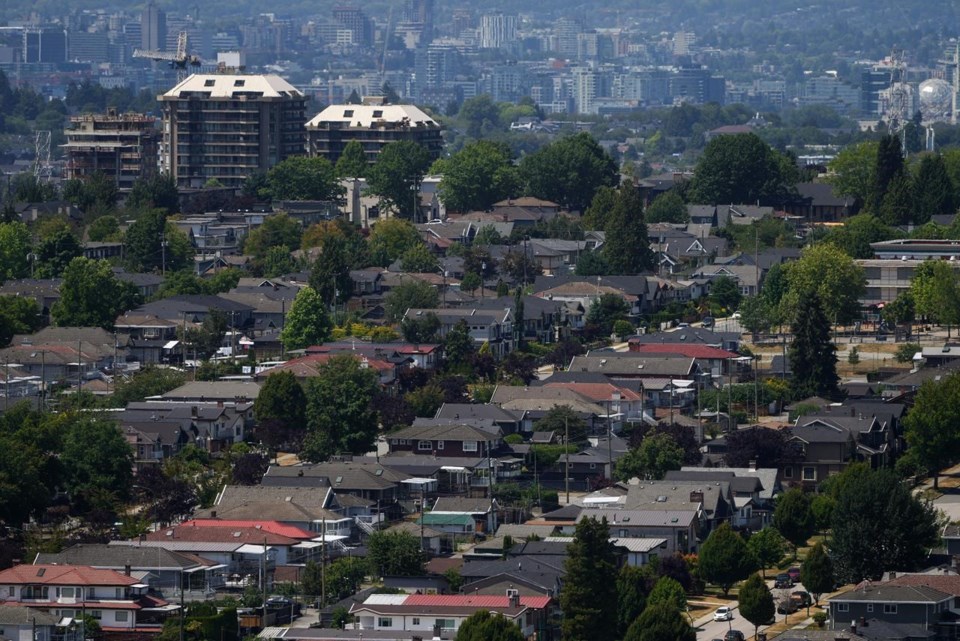VICTORIA — The British Columbia government has introduced legislation aimed at easing the housing crisis by spurring the development of small-scale and multi-unit homes.
The new law would require local governments to update zoning bylaws to permit multi-unit buildings on lots typically used for single-family detached homes.
Cities are to allow at least three units on lots up to 280 square metres in size, while at least four units are to be permitted on larger lots, and at least six units will be allowed on larger lots that are close to transit stops with frequent service.
The legislation applies within urban containment boundaries and municipalities with populations over 5,000, although Housing Minister Ravi Kahlon said that doesn't include Vancouver because the city is working under a different system.
"The work with the City of Vancouver is happening right now and my expectation is that in the new year, in the spring, we'll have legislation that will closely align Vancouver's charter to what we believe is the path forward for all municipalities," Kahlon told a news conference after introducing the legislation on Wednesday.
Vancouver council approved bylaw changes allowing for multi-unit homes in neighbourhoods where only single-family homes had been allowed earlier this fall.
Similar policies have also been introduced in Victoria, Kelowna and Kimberley.
The provincial law would also require at least one secondary suite or laneway home to be allowed on lots zoned single-family or duplex in communities throughout B.C.
A statement from Premier David Eby said "outdated zoning rules" are making it harder for people in B.C. to find a place to live in their own communities.
"Constructing mostly highrise condo towers or single-family homes means B.C. isn't building enough small-scale multi-unit homes that fit into existing neighbourhoods and give people more housing options that are within reach."
Local governments will be expected to update their bylaws to accommodate the new zoning requirements by the end of June next year, a provincial statement said.
The B.C. government will release $51 million along with a policy manual in order to support the implementation of the required changes, it said.
Kahlon said the legislation is also aimed at "significantly streamlining and speeding up how housing is planned for and approved."
The changes would phase out one-off public hearings over rezonings for housing developments that are consistent with official community plans, the province said.
"Instead, there will be more frequent opportunities for people to be involved ... earlier in the process when official community plans are updated," it said.
The new law includes requirements for official community plans to be updated every five years, with public engagement, as well as planning for enough homes to match forecasted growth over the next two decades, rather than five years.
Asked whether the legislation would drive up the value and cost of single-family homes and lots through speculation, Kahlon said the experiences of other jurisdictions suggest a "major" lift is not expected with provincewide changes.
"By doing this in a provincial way, we're actually ensuring that the lift in land value is not as significant as it would be otherwise," he said.
Kahlon said he expects the legislation will spur "creative solutions" and what that looks like will vary by community.
"We may see some strata units, we may see some units that are staying intact for family reasons. In the end, we want to see more housing options available."
The proposed law creates a standard for the whole province, Kahlon said.
Single-family homes will still be built by those who can afford them, he added.
The provincial statement said a preliminary analysis indicates B.C. could see more than 130,000 new small-scale homes over the next 10 years as a result of the changes, although it notes that modelling can't account for unforeseen circumstances or the changing nature of housing and real estate markets.
The legislation comes ahead of a provincial pilot project launching next spring to provide forgivable loans of up to $40,000 to help homeowners build a secondary suite and rent it out below market rates.
— By Brenna Owen in Vancouver
This report by The Canadian Press was first published Nov. 1, 2023.
The Canadian Press



